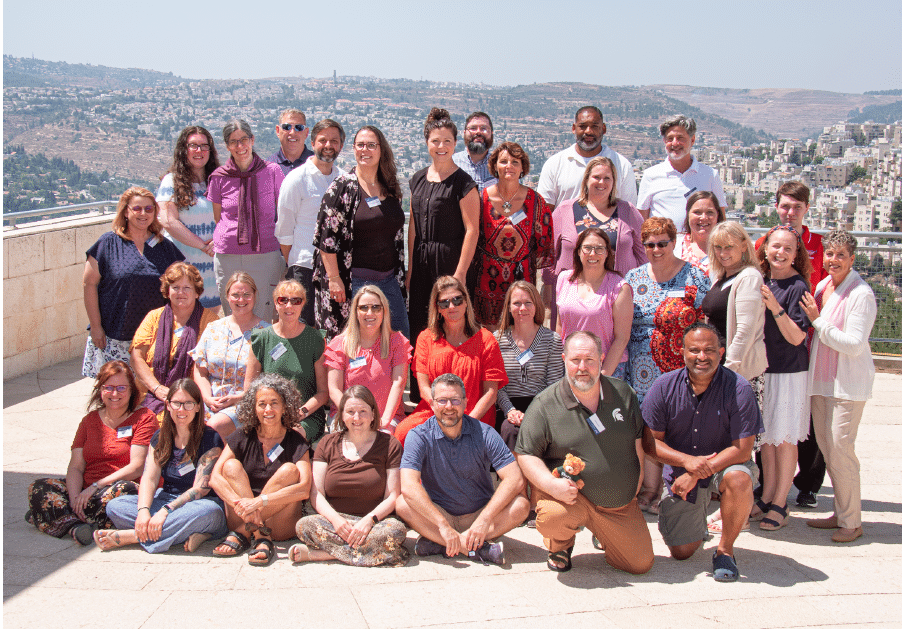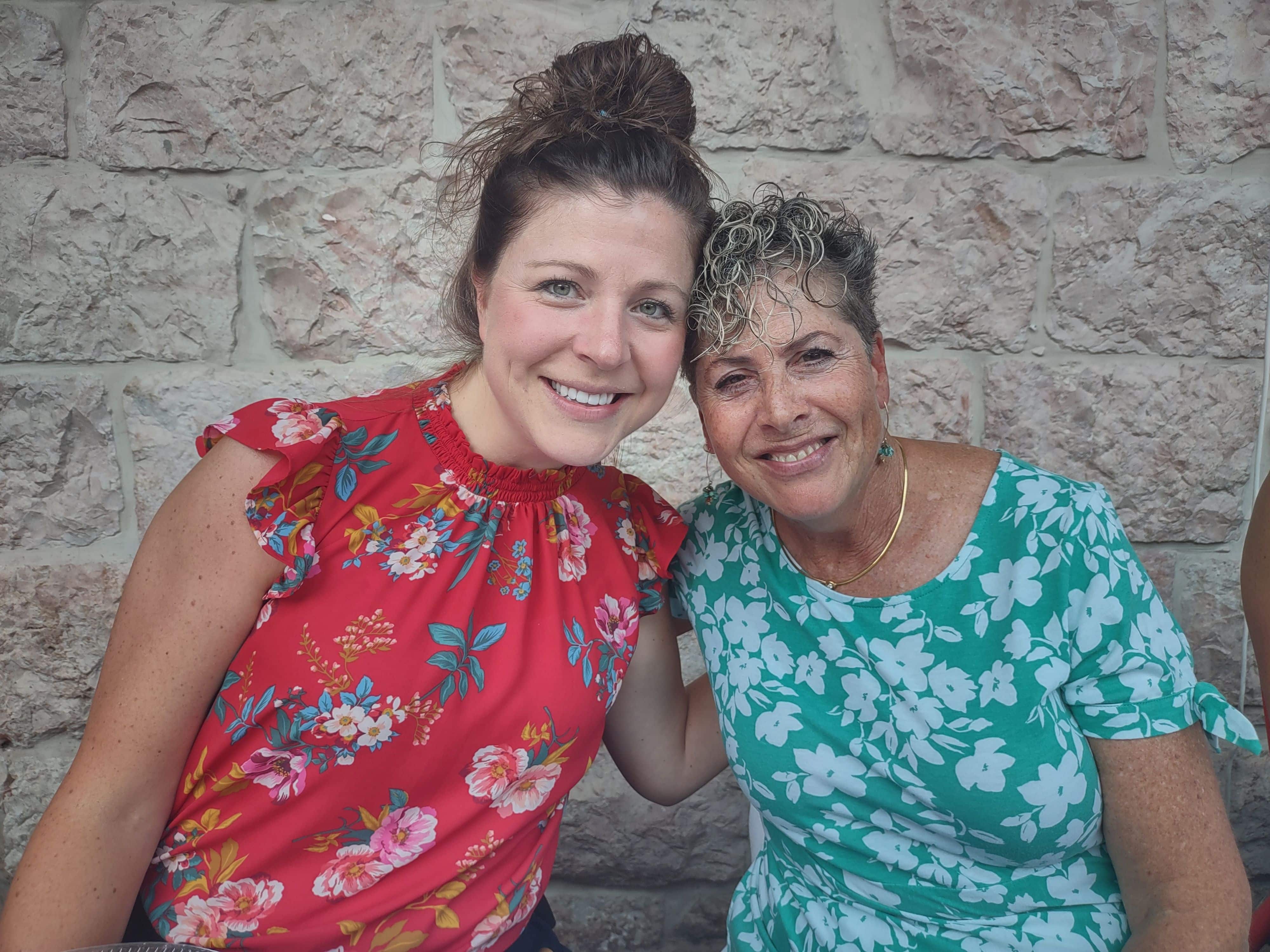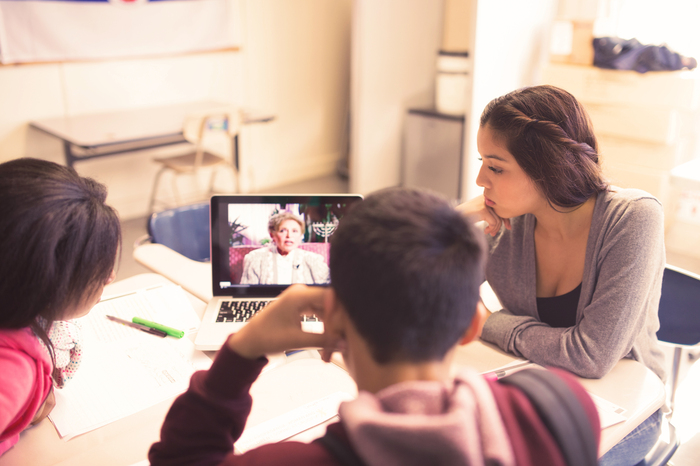
HOLOCAUST EDUCATION
TEACHING

This will be my twenty-ninth-year teaching and I still get butterflies in my stomach on the first day of school. I am consumed by nerves, anxiety, the thought of what more I need to do to be ready for the beginning of the school year. What should be taught, how it should be assessed, how to handle time constraints yet meet standards are the types of questions I, and frankly all educators, ponder as I lay out my courses. Fortunately, as a Holocaust educator, I feel empowered to meet these challenges thanks to the world class content and pedagogy I learned this summer at the 2023 Echoes & Reflections Advanced Learning Seminar. I am grateful that I was one of thirty talented educators selected from the United States to study for ten days at the International School For Holocaust Studies in Jerusalem with the purpose of improving our Holocaust education practice.

The power of the program is founded on its design, starting with the setting. Held at Yad Vashem, the World Holocaust Remembrance Center in Jerusalem, the program put us at the heart of Holocaust education with firsthand documents and accounts within arm’s reach. Added to the setting was the privilege to learn and collaborate with a fantastic cohort of educators from diverse backgrounds and experiences, each with a passion for Holocaust education. We learned from experts, including some of the best scholars in the world, a charismatic rabbi, and the last active Nazi Hunter from the Simon Wiesenthal Center.
The seminar was intense, but managed well, carefully organized, and systematic in its approach. Each day was integrated with content from Echoes & Reflections teaching Units and lesson plans, to complement presentations from experts in the field”. Within the 45-acre campus of Yad Vashem, we were given personalized tours of the Holocaust History Museum, the Valley of the Communities, , the Holocaust Art Museum, the Yad Vashem Archives, and the Garden of the Righteous Among the Nations, to name a few. Beyond the walls of Yad Vashem, we met Holocaust survivors in their home, had an inspiring, guided tour of the Old City of Jerusalem, and an unforgettable day trip to the Dead Sea and Masada.
Having described my experiences at Yad Vashem, I want to reflect on the impact they had on me as a life-long learner and teacher. For teachers, great professional development fills our cups and benefits student learning and outcomes. Coming away with something that can be implemented in the classroom immediately is my primary barometer of good professional development. We are always learning something; the key is what we will do with this knowledge. As a result of this Seminar, I aim to be more intentional about lifting people up when I teach the Holocaust, deemphasizing much of the darkness I focused on earlier in my career. Though I was well intentioned when I taught about the Nazi years, including the process of dehumanizing Jews and the sheer numbers of Jews and others murdered in Europe, I now plan on spending more energy contextualizing this important part of Jewish history, letting students know what life was like for ordinary people who happened to be Jewish. They were people with brothers, sisters, uncles, classmates, and teammates and they had hobbies and dreams. I hope to lift the voices and share the stories about these people and their memories. My students need to understand that antisemitism did not start with the Nazis; they need to know that it goes back two millennium, that this is the longest hatred we know, and to be mindful of how it festers today. They need to examine this history and the many choices that were made and understand the cost of letting down our guard to bigotry, fear, and hatred.
This vision of student outcomes that are inspiring and mobilizing is what permeates my preparation this year. What I learned in the Echoes & Reflections Advanced Learning Seminar is crucial to students at this moment and in this country. Never forget.
About the author: Bradley E. Sultz is a proud teacher and advocate of public education and teaches at iPrep Academy, a highly recognized school in Miami, Florida. Bradley teaches AP Psychology, AP World History: Modern, Honors World History, AP Macroeconomics, and Honors Economics and is an AP World History: Modern Reader for the College Board, an AP World History: Modern Teacher Trainer and Teacher Mentor for Miami-Dade County Public Schools (the third largest school district in the country), and a Holocaust Education Advocate.

HOLOCAUST EDUCATION
TEACHING

As the wheels touched down at Ben Gurion Airport in Tel Aviv, Israel, the real adventure began: the opportunity to participate in the Echoes & Reflections Advanced Seminar for Educators at Yad Vashem in Jerusalem. Israel is about as different as it gets compared to my ranching community in the rolling Sandhills of rural Nebraska; and even though I have traveled quite a bit, this part of the world was totally new to me. On the outside I tried to keep my demeanor calm, however, on the inside my heart and mind were thrilled…and a little nervous. This is what happens when we allow ourselves to say yes to adventure. Take the leap. Teaching became even more enjoyable for me when I figured out that I could mesh my profession with my passions. Not only do these kinds of opportunities enhance my school and community, but these experiences also elevate my humanity and how I interact with the world.
What did I learn?
- During the intense 10-day seminar my mind encountered a not-so-little shift in how I approach the Holocaust with my students. I am the only English teacher at my school in rural Nebraska, so I have the unique opportunity to build my Holocaust units year upon year. The seminar at Yad Vashem made it clear to me that I have room for improvement. Living in a community with no Jewish people, one of the reasons I wanted to attend this seminar was to gain a better understanding of Jewish culture, traditions, history, and perspectives. My pen actually ran out of ink because of all the notes I took! Now that I have increased knowledge about Jewish life, and with the help of Echoes & Reflections, I can better pass on what I’ve learned to my students in a responsible way, using heavily vetted resources and personal testimony. This upcoming school year I will be using several lesson plans from Echoes & Reflections, particularly Unit 1. Studying the Holocaust, Lesson 2: Prewar Jewish Life.
- English teachers are known to be sticklers about word choice, and during one of the sessions, I was reminded about how the precision of language is vitally important when we teach about the Holocaust. For example, terms such as the “Final Solution” and extermination camps are perpetrator language, so educators must use caution when using these words with students. Words matter. As we continue to witness a rise in Holocaust denial and distortion, it is more important than ever to educate ourselves on appropriate and precise language when speaking about the Holocaust to our students and community members.
- One particularly powerful day was our trek to the Garden of the Righteous Among the Nations. I have a very personal connection to a Holocaust survivor who was saved by someone bestowed with this honor: a non-Jew who put himself and his family at mortal risk to save Jews during the Holocaust and received no compensation. I was three years old when I first met a Holocaust survivor named Sally, and through the years I have told Sally’s story and she has done numerous video chats with my students. Sally and her family were saved by Stanislaw Grocholski, who hid 15 people in his attic in rural Poland for two years. Stanislaw was named a Righteous and it was important for me to find his name in the Garden. While our group was in the Garden, Sheryl Ochayon, Project Director at Yad Vashem for Echoes & Reflections and one of our leaders, asked if I would tell Stanislaw’s story. After I finished, Sheryl said, “Megan, you know the story well, but there’s one thing you don’t know. Sally is my aunt. My mother was in that attic, too.” Immediately I was crying. Sheryl was crying. Our cohort was crying. It was an incredible moment that will stay with me for a lifetime. Sheryl said that some members of her family often wonder why she chose her job, and she said, “This is exactly why I do what I do. Megan lives in the middle of Nebraska in a town of 150 people with no Jewish community. And yet, each and every year she tells my family’s story and the story of Stanislaw.” I think about all of the people connected to the Holocaust and on that day, in that space, two people from different parts of the world, created a bond. Yad Vashem highlights the importance of giving victims and survivors their faces and names back. We need to hear their voices and see them as full people: before, during, and after the Holocaust.

Megan Helberg & Sheryl Ochayon, Project Director at Yad Vashem for Echoes & Reflections
I am eager to share what I learned during my time at Yad Vashem, about the importance of learning from multiple perspectives, and how vital it was for me to learn about the Holocaust while physically being in Israel surrounded by Jewish life. My experience at the Echoes & Reflections seminar cannot be replicated anywhere else, and I am grateful to have Echoes & Reflections lesson plans to help me appropriately teach what I learned to my students. Something I have come to recognize is that just because my students are from a rural area, it does not mean they are any less eager to learn. They simply need an opportunity, and I can offer them this important learning experience.
With that said, teachers, this is your chance to make the leap. Apply for programs that will enhance you professionally and personally. Be the person that brings these learning opportunities to your students, no matter where they call home. Just think, next year you may be telling the story of when the wheels of your airplane touched down in Israel.
About the author: Megan Helberg lives and teaches English in rural Nebraska where she is surrounded by the rolling Sandhills. She is the 2020 Nebraska Teacher of the Year and passionate about traveling the world in order to bring back as much knowledge and love and opportunities as she can for her students.




This site contains links to other sites. Echoes & Reflections is not responsible for the privacy practices or the content of such Web sites. This privacy statement applies solely to information collected by echoesandreflections.org.
We do not use this tool to collect or store your personal information, and it cannot be used to identify who you are. You can use the Google Analytics Opt-Out Browser Add-on to disable tracking by Google Analytics.
We currently do not use technology that responds to do-not-track signals from your browser.
Users may opt-out of receiving future mailings; see the choice/opt-out section below.
We use an outside shipping company to ship orders. These companies are contractually prohibited from retaining, sharing, storing or using personally identifiable information for any secondary purposes.
We may partner with third parties to provide specific services. When a user signs up for these services, we will share names, or other contact information that is necessary for the third party to provide these services.
These parties are contractually prohibited from using personally identifiable information except for the purpose of providing these services.
1. You can unsubscribe or change your e-mail preferences online by following the link at the bottom of any e-mail you receive from Echoes & Reflections via HubSpot.
2. You can notify us by email at info@echoesandreflections.org of your desire to be removed from our e-mail list or contributor mailing list.






 English
English